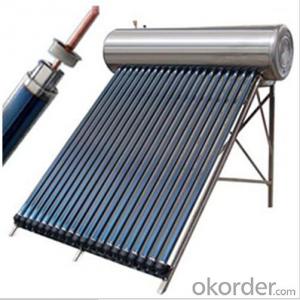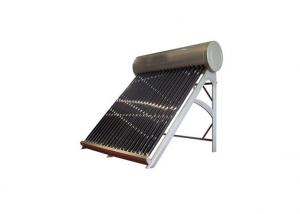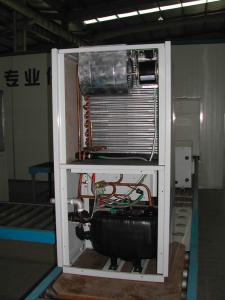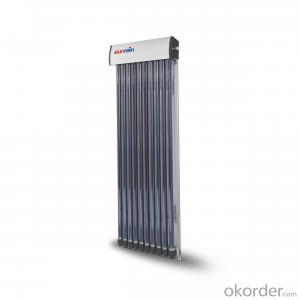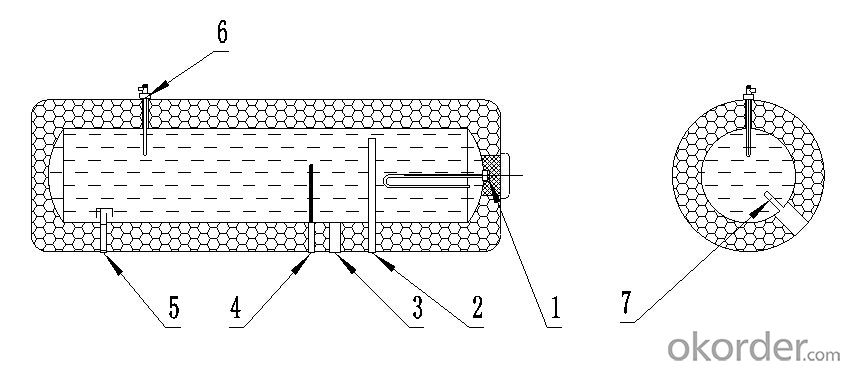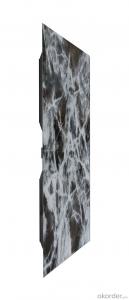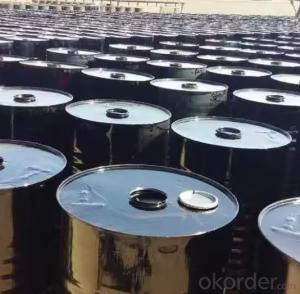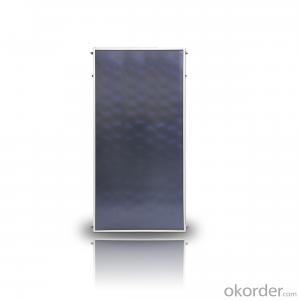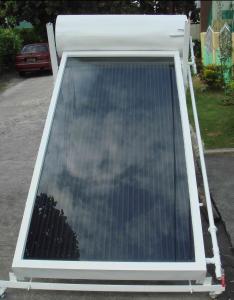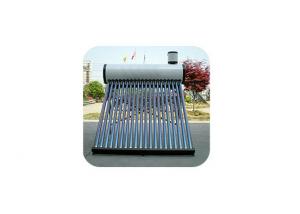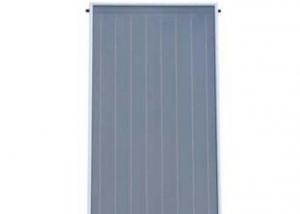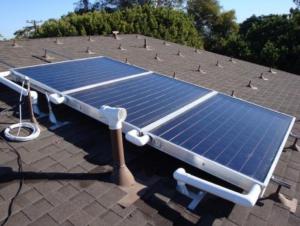Integrative Pressurized Stainless Steel Solar Water Heater Model SP-HS
- Loading Port:
- Shanghai
- Payment Terms:
- TT or LC
- Min Order Qty:
- 10 set
- Supply Capability:
- 2500 set/month
OKorder Service Pledge
OKorder Financial Service
You Might Also Like
Pressurized Stainless Steel Solar Water Heater Model SP-HS is composed by the following parts as shown in the graphic
1.Water inlet 2.Water outlet 3.P/T Valve 4.Electrical heater 5.Drain vent 6.Sensor hole 7. Heat exchange tube |
|
2.Main Features of the Pressurized Stainless Steel Solar Water Heater Model SP-HS:
(1)Glass vacuum tube solar collector, high temperature,antifreeze,vacuum insulation
(2)Copper heat pipe,Start up quickly,transfers heat quickly, low start-up temperature,low temperature resistant
(3) Food-grade stainless-steel SUS304 2B inner tank,full-automatic welding technology,under the protection of magnesium rod,it can increase of service life
(4)High pressure polyurethane foaming insulation,as the prefect density and the thermal conductivity coefficient is small, so it can provide effective heat preservation
(5)Gravity assisted heat pipe, unilateral heat transfer,high efficiency,low heat loss
3. Pressurized Stainless Steel Solar Water Heater Model SP-HS Images:
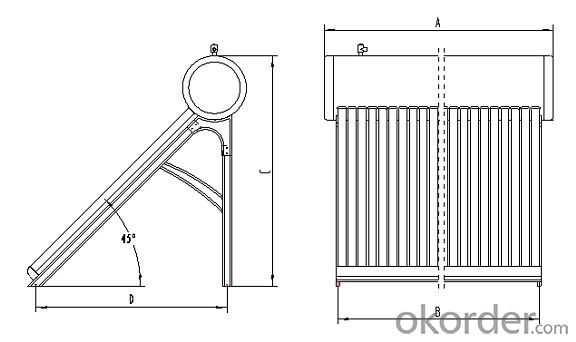
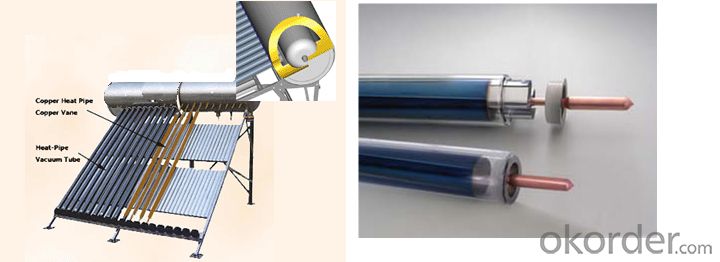
4. Pressurized Stainless Steel Solar Water Heater Model SP-HS Specifications:
Specification & model | SP-H-15 | SP-H-18 | SP-H-20 | SP-H-24 | SP-H-25 | SP-H-30 | ||
Tube QTY(pcs) | 15 | 18 | 20 | 24 | 25 | 30 | ||
Tube spacing㎜) | 75 | 75 | 75 | 75 | 75 | 75 | ||
WATER TANK | ||||||||
Net Volume of Storage Tank(L) | 125 | 145 | 160 | 190 | 200 | 235 | ||
Diamater of inner/outer Tank(㎜) | φ360/φ470 | φ360/φ470 | φ360/φ470 | φ360/φ470 | φ360/φ470 | φ360/φ470 | ||
material and thickness of inner tank(㎜) | SUS304 /t1.2 | SUS304 /t1.2 | SUS304 /t1.2 | SUS304 /t1.2 | SUS304 /t1.2 | SUS304 /t1.2 | ||
material of outer tank | stainless steel | stainless steel | stainless steel | stainless steel | stainless steel | stainless steel | ||
material of insulation | polyurethane | polyurethane | polyurethane | polyurethane | polyurethane | polyurethane | ||
Size of electrical heater hole | 11/4″ | 11/4″ | 11/4″ | 11/4″ | 11/4″ | 11/4″ | ||
Cold water inlet hole | 3/4″ | 3/4″ | 3/4″ | 3/4″ | 3/4″ | 3/4″ | ||
Hot water outlet hole | 3/4″ | 3/4″ | 3/4″ | 3/4″ | 3/4″ | 3/4″ | ||
T/P valve hole | 3/4″ | 3/4″ | 3/4″ | 3/4″ | 3/4″ | 3/4″ | ||
Drain vent hole and Magnisium hole | 3/4″ | 3/4″ | 3/4″ | 3/4″ | 3/4″ | 3/4″ | ||
Sensor hole | 1/2″ | 1/2″ | 1/2″ | 1/2″ | 1/2″ | 1/2″ | ||
Vacuum Tube | ||||||||
Diameter/Length(㎜) | φ58/1800 | φ58/1800 | φ58/1800 | φ58/1800 | φ58/1800 | φ58/1800 | ||
Material | High boron and silicon glass 3.3 | High boron and silicon glass 3.3 | High boron and silicon glass 3.3 | High boron and silicon glass 3.3 | High boron and silicon glass 3.3 | High boron and silicon glass 3.3 | ||
Outside thickness(㎜) | 1.8 | 1.8 | 1.8 | 1.8 | 1.8 | 1.8 | ||
Inside thickness(㎜) | 1.6 | 1.6 | 1.6 | 1.6 | 1.6 | 1.6 | ||
Light transmission rate | ≥0.90 | ≥0.90 | ≥0.90 | ≥0.90 | ≥0.90 | ≥0.90 | ||
Vacuum degree (Pa) | <10^-2 | <10^-2 | <10^-2 | <10^-2 | <10^-2 | <10^-2 | ||
Coating absorption | ≥0.90 | ≥0.90 | ≥0.90 | ≥0.90 | ≥0.90 | ≥0.90 | ||
Coating emittance | ≤0.07 | ≤0.07 | ≤0.07 | ≤0.07 | ≤0.07 | ≤0.07 | ||
Average heat loss coefficient | ≤0.75W/(㎡·℃) | ≤0.75W/(㎡·℃) | ≤0.75W/(㎡·℃) | ≤0.75W/(㎡·℃) | ≤0.75W/(㎡·℃) | ≤0.75W/(㎡·℃) | ||
Frame | 2 feets ( left-to-right ) | 3 feets ( left-middle-right ) | ||||||
Material | Galvanized steel t1.2 | Galvanized steel t1.2 | Galvanized steel t1.2 | Galvanized steel t1.2 | Galvanized steel t1.2 | Galvanized steel t1.2 | ||
Angle | 45° | 45° | 45° | 45° | 45° | 45° | ||
Tube support Specification/hole distance(㎜ | φ58/75 | φ58/75 | φ58/75 | φ58/75 | φ58/75 | φ58/75 | ||
Accessories: | ||||||||
Tube sealing ring | Silicon rubber/φ58 | Silicon rubber/φ58 | Silicon rubber/φ58 | Silicon rubber/φ58 | Silicon rubber/φ58 | Silicon rubber/φ58 | ||
Tube dusting rings | Silicon rubber/φ58 | Silicon rubber/φ58 | Silicon rubber/φ58 | Silicon rubber/φ58 | Silicon rubber/φ58 | Silicon rubber/φ58 | ||
Tube holder | ABS/φ58 | ABS/φ58 | ABS/φ58 | ABS/φ58 | ABS/φ58 | ABS/φ58 | ||
Item Size:: | ||||||||
a (㎜) | 1385 | 1610 | 1760 | 2060 | 2135 | 2510 | ||
b (㎜) | 1110 | 1335 | 1485 | 1785 | 1860 | 2235 | ||
c (㎜) | 1700 | 1700 | 1700 | 1700 | 1700 | 1700 | ||
c/2 (㎜) | —— | —— | —— | 892.5 | 930 | 1255 | ||
d (㎜) | 1430 | 1430 | 1430 | 1430 | 1430 | 1430 | ||
5. FAQ
(1). How do I protect my solar system during subzero temperatures?
If you have a system that is operating in areas with subzero temperatures then freeze protection must be implemented. The easiest means of preventing freezing is to use a controller with a low temperatures setting, so when the manifold temperature drops below a certain pre-set temperature (5oC/40oF), the pump will circulate, warming the collector with water from the bottom of the storage tank. The pump will not run continually, just periodically, the frequency of which will depend on the outside temperature. In extremely cold areas, a closed loop using a glycol/water mix may be appropriate.
(2). Will water be heated on a cloudy day?
Yes. Although the heat output of the solar collector is reduced on overcast days it will still be able to provide heating. If it is a heavily clouded day or raining, then more gas or electric boosting may be required to maintain water at the required temperature. This system will be automated so you don't have to worry about running out of hot water on a rainy day.
- Q:Can a solar water heater be installed in a mobile home?
- Yes, a solar water heater can be installed in a mobile home. The installation process may vary depending on the specific design and structure of the mobile home, but with the right equipment and professional assistance, it is definitely possible to harness solar energy to heat water in a mobile home.
- Q:Can a solar water heater be used in areas with limited access to natural gas?
- Yes, a solar water heater can be used in areas with limited access to natural gas. Solar water heaters utilize sunlight to heat water, eliminating the need for natural gas or any other fossil fuels. They are an environmentally friendly and cost-effective alternative for heating water in areas where natural gas availability is limited.
- Q:Can a solar water heater be used in areas with limited access to solar radiation or sunlight due to geographical factors?
- Solar water heaters, despite being primarily designed to utilize solar radiation as their main energy source, can still be utilized in regions with restricted sunlight due to geographical factors. Nevertheless, the efficiency and effectiveness of the solar water heater may be significantly diminished in such areas. In areas with limited solar radiation, the solar water heater may not generate enough heat to meet the desired temperature requirements. This can be particularly problematic on cloudy or overcast days when the solar panels cannot capture sufficient sunlight. Nonetheless, when employing solar water heaters in regions with limited access to solar radiation, several factors need to be taken into account. Firstly, the geographical location and climate should be carefully evaluated. If the area still receives a moderate amount of sunlight throughout the year, albeit less than optimal, a solar water heater can still be a viable option. Additionally, the orientation and tilt angle of the solar panels can be adjusted to maximize the absorption of available sunlight. By positioning the panels at the optimal angle and direction, they can capture sunlight more efficiently, even in areas with reduced solar radiation. Furthermore, selecting a solar water heater with a larger collector area or capacity is crucial. This allows for better absorption and storage of the available solar energy, compensating for the limited amount of sunlight. In regions with extremely limited access to solar radiation, alternative energy sources or hybrid systems can be considered. These systems combine solar energy with other sources, such as electricity or gas, to ensure a consistent supply of hot water, even during periods of low solar radiation. In conclusion, although solar water heaters may not operate as efficiently in areas with limited access to solar radiation, they can still be utilized with specific adjustments and considerations. It is essential to assess the specific geographical factors and availability of sunlight to determine the feasibility and effectiveness of using solar water heaters in such areas.
- Q:What are the common repair issues with a solar water heater?
- Some common repair issues with a solar water heater include leaks, faulty temperature sensors, malfunctioning pumps or valves, and buildup of mineral deposits in the system.
- Q:How does the efficiency of a solar water heater vary based on the climate?
- The efficiency of a solar water heater varies based on the climate primarily due to the availability of sunlight. In regions with abundant sunshine and high temperatures, such as tropical climates, solar water heaters tend to be more efficient as they can harness more solar energy to heat the water. However, in colder or cloudier climates, the efficiency may decrease as there is less sunlight available to provide the necessary heat. Additionally, extreme weather conditions like snow or heavy rain can also affect the efficiency of solar water heaters.
- Q:Can a solar water heater be used in areas with high levels of saltwater or corrosive environments?
- Yes, a solar water heater can be used in areas with high levels of saltwater or corrosive environments. However, it is important to select a solar water heater specifically designed for such conditions. This is because regular solar water heaters may be susceptible to corrosion from the saltwater or other corrosive elements present in such environments. In areas with high levels of saltwater or corrosive environments, it is recommended to use solar water heaters that have components made of corrosion-resistant materials, such as stainless steel or specially coated tanks and collectors. These materials are more resistant to the corrosive effects of saltwater and other corrosive elements, ensuring the longevity and efficiency of the solar water heater. Additionally, regular maintenance and cleaning are crucial in such environments to remove any salt deposits or corrosive substances that may accumulate on the solar water heater. This will help to prolong the lifespan and optimize the performance of the system. By choosing a solar water heater specifically designed for high saltwater or corrosive environments and implementing proper maintenance practices, it is possible to successfully utilize solar water heaters in these areas.
- Q:How does a solar water heater compare to a traditional electric or gas water heater?
- A solar water heater is more environmentally friendly and energy-efficient compared to a traditional electric or gas water heater. It relies on renewable solar energy to heat water, resulting in lower greenhouse gas emissions and reduced reliance on fossil fuels. Although the initial installation cost may be higher, solar water heaters can save money in the long run due to lower operating costs. However, their effectiveness may vary depending on climate and sunlight availability, whereas electric or gas water heaters can work reliably in all conditions.
- Q:How does the angle of the storage tank affect the performance of a solar water heater?
- The angle of the storage tank plays a significant role in the performance of a solar water heater. It determines the effectiveness of capturing solar energy and converting it into heat. A proper angle ensures that the sunlight hits the collector panels at an optimal angle, maximizing the absorption of solar radiation. If the tank is positioned too vertically or horizontally, it can result in reduced efficiency as the sunlight may not hit the panels directly. Therefore, the angle of the storage tank is crucial for maximizing the performance and efficiency of a solar water heater.
- Q:Can a solar water heater be used with a swimming pool?
- Yes, a solar water heater can be used with a swimming pool. Solar water heaters use the sun's energy to heat water, and this heated water can be circulated through the swimming pool to raise its temperature. It is an environmentally friendly and cost-effective option for heating swimming pool water.
- Q:Are there any environmental benefits of using a solar water heater?
- Yes, there are several environmental benefits of using a solar water heater. Firstly, solar water heaters utilize renewable energy from the sun, reducing the dependence on fossil fuels and decreasing greenhouse gas emissions associated with traditional water heating methods. Additionally, they have a smaller carbon footprint as they do not require electricity or gas to operate, resulting in lower overall energy consumption. Lastly, solar water heaters help conserve water by reducing the need for traditional water heating methods that often involve water wastage.
1. Manufacturer Overview |
|
|---|---|
| Location | |
| Year Established | |
| Annual Output Value | |
| Main Markets | |
| Company Certifications | |
2. Manufacturer Certificates |
|
|---|---|
| a) Certification Name | |
| Range | |
| Reference | |
| Validity Period | |
3. Manufacturer Capability |
|
|---|---|
| a)Trade Capacity | |
| Nearest Port | |
| Export Percentage | |
| No.of Employees in Trade Department | |
| Language Spoken: | |
| b)Factory Information | |
| Factory Size: | |
| No. of Production Lines | |
| Contract Manufacturing | |
| Product Price Range | |
Send your message to us
Integrative Pressurized Stainless Steel Solar Water Heater Model SP-HS
- Loading Port:
- Shanghai
- Payment Terms:
- TT or LC
- Min Order Qty:
- 10 set
- Supply Capability:
- 2500 set/month
OKorder Service Pledge
OKorder Financial Service
Similar products
New products
Hot products
Hot Searches
Related keywords
